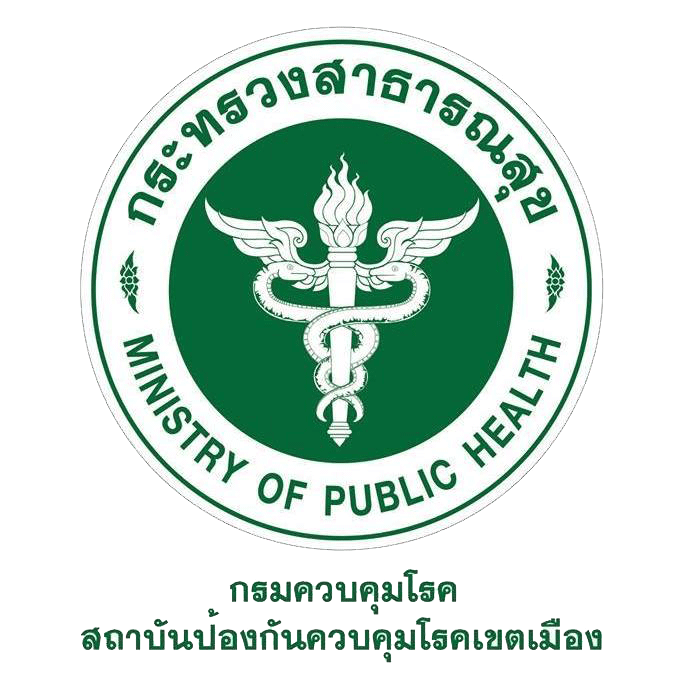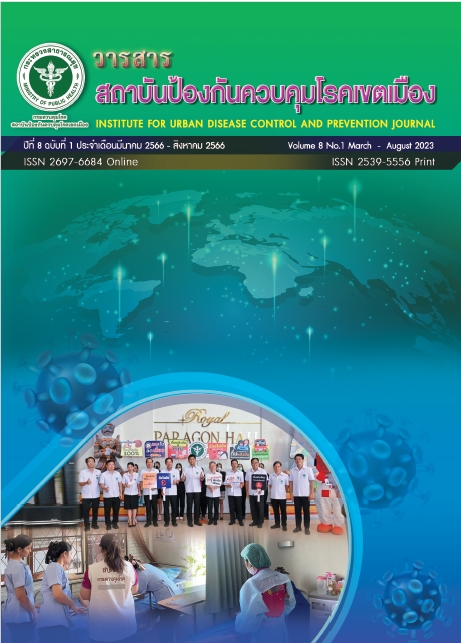การประเมินความรู้ในการเฝ้าระวัง ป้องกันและควบคุมโรคติดเชื้อไวรัสโคโรนา 2019 ของอาสาสมัครแรงงานข้ามชาติในจังหวัดภูเก็ต
Main Article Content
บทคัดย่อ
การศึกษาครั้งนี้ มีวัตถุประสงค์เพื่อประเมินความรู้ และจัดการฝึกปฏิบัติแก่อาสาสมัครแรงงานข้ามชาติผู้ใช้แรงงานด้านอุตสาหกรรม ในการเฝ้าระวัง ป้องกันและควบคุมโรคติดเชื้อไวรัสโคโรนา 2019 ของอาสาสมัครแรงงานข้ามชาติในจังหวัดภูเก็ต ศึกษาด้วยวิธีการเก็บข้อมูลแบบตัดขวางวัดความรู้ก่อน และหลังการฝึกอบรม และการจัดอบรมอาสาสมัครแรงงานข้ามชาติเรื่องความรู้เกี่ยวกับโรคติดเชื้อไวรัสโคโรนา 2019 และการฝึกปฏิบัติในการเฝ้าระวัง ป้องกันและควบคุมโรค กลุ่มตัวอย่าง กลุ่มแรงงานข้ามชาติคัดเลือกทำการเลือกสุ่มแบบเจาะจงโดยต้องเป็นแรงงานข้ามชาติที่ถูกต้องตามกฎหมาย เนื่องจากไม่ทราบจำนวนประชากรแรงงานข้ามชาติที่แน่นอนผู้วิจัยจะสุ่มกลุ่มตัวอย่างจากพื้นที่ ที่เข้าสำรวจการลงทะเบียนข้อมูลระบบบันทึกอาสาสมัครสุขภาพแรงงานข้ามชาติ จำนวน 404 คน ดำเนินการเก็บข้อมูลระหว่างวันที่ 1 กุมภาพันธ์ - 31 สิงหาคม 2565 ของจังหวัดภูเก็ต ประกอบไปด้วย อำเภอเมืองภูเก็ต อำเภอถลาง และอำเภอกระทู้
ผลการศึกษา มีผู้เข้ารับการอบรม จำนวน 404 คน เป็นเพศหญิง (56.68%) มากกว่าเพศชาย (43.32%) อายุเฉลี่ย 45.20 ปี (SD=15.28) อายุมากกว่า 60 ปีขึ้นไป (15.40%) คะแนนความรู้ก่อนและหลังจากการอบรม มีค่าเฉลี่ยเท่ากับ 4.60 และ 7.40 คะแนนตามลำดับ โดยคะแนนหลังการอบรมสูงกว่าก่อนการอบรมอย่างมีนัยสำคัญทางสถิติ (P>0.01) การประเมินองค์ความรู้และฝึกปฏิบัติ พบว่า แรงงานยังมีความไม่เข้าใจในเรื่องการปฏิบัติตัวเพื่อป้องกันการติดโรคติดเชื้อไวรัสโคโรนา 2019 เช่น การรับประทานอาหาร การใช้ของใช้ร่วมกัน รองลงมา คือ ยังขาดความเข้าใจว่า โรคติดเชื้อไวรัสโคโรนา 2019 อาจก่อให้เกิดการเจ็บป่วยระยะยาวที่เรียกภาวะลองโควิด ซึ่งหมายถึง โรคติดเชื้อไวรัสโคโรนา 2019 ที่มีอาการต่อเนื่องนานกว่า 3 เดือน และอาจมีผลต่อร่างกายถาวรและมีอาการ เช่น เจ็บหน้าอก ใจสั่น ชา แขนขาอ่อนแรง ควรรีบไปพบแพทย์
ดังนั้นการดูแลแรงงานข้ามชาติเกี่ยวกับโรคติดเชื้อไวรัสโคโรนา 2019 ควรมุ่งเน้นในเรื่องการปฏิบัติตัว เช่น การหลักเลี่ยงการรับประทานอาหารร่วมกัน การทำให้เข้าใจถึงอันตรายของการป่วยเป็นลองโควิด และเครือข่ายอาสาสมัครแรงงานข้ามชาติมีความสำคัญในการป้องกันควบคุมโรค แต่ในทางปฏิบัติควรมีการสื่อสารที่ดำเนินการโดยภาษาของกลุ่มอาสาสมัครแรงงานข้ามชาติ จำกัดจำนวนผู้เข้ารับการอบรม มีการจัดสรรทรัพยากร และสถานที่ให้เพียงพอ รวมถึงการเปิดโอกาสให้มีการซักถามระหว่างการอบรม
Article Details

อนุญาตภายใต้เงื่อนไข Creative Commons Attribution-NonCommercial-NoDerivatives 4.0 International License.
บทความที่พิมพ์ในวารสารสถาบันป้องกันควบคุมโรคเขตเมือง ถือว่าเป็นผลงานวิชาการ งานวิจัยและวิเคราะห์ ตลอดจนเป็นความเห็นส่วนตัวของผู้เขียนเอง ไม่ใช่ความเห็นของสถาบันป้องกันควบคุมโรคเขตเมือง หรือคณะบรรณาธิการแต่ประการใด ผู้เขียนจำต้องรับผิดชอบต่อบทความของตน
เอกสารอ้างอิง
Foreign Workers Administration Office. (2019). Statistics of total number of foreign workers with work permit in Kingdom of Thailand 2019. Bangkok.
International Organization for Migration. (2011). Thailand Migration Report 2011. Bangkok: International Organization for Migration, Thailand office.
International Organization for Migration. (2020). World migration report 2020. Geneva: International Organization for Migration.
international task force for COVID-19. (2021). COVID-19 KAP questionnaires. washington dc: Centers for diesases control and prevention.
Kauffman K S, M. D. (1997). The changing role of village health volunteers in northeast Thailand: an ethnographic field study. International Journal of Nursing Studies, Elsevier, 249-255.
Registration Office Department of the Interior, Ministry of the Interior. (2018). Population and house statistics for the year 2018. Bangkok: Ministry of the interior.
Wright, W. F. (2018). Essentials of Clinical Infectious Diseases, 2nd Edition. New York: Springer publishing company.


